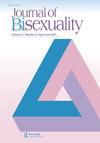提供者双相恐惧症和微信息对双性恋患者寻求治疗意愿的影响
IF 1.9
Q2 SOCIAL SCIENCES, INTERDISCIPLINARY
引用次数: 7
摘要
摘要双性恋者患精神疾病的比率高于单性恋者。此外,先前的研究发现,双性恋者面临心理健康提供者的歧视。然而,缺乏研究来检验与提供者的负面经历如何影响双性恋客户对心理健康护理利用的态度。本研究探讨了双性恋个体对提供者的排斥程度、提供者双恐惧症的经历、提供者的微确认经历和寻求帮助的态度之间的关系。我们假设:(a)心理健康提供者的反双性恋经历会介导外向和寻求帮助意图之间的关系,(b)提供者的微信息会介导内向和寻求帮助意愿之间的关系。结果表明,与心理健康提供者的接触程度越高,心理健康提供者就有越大的微确认体验。正如预期的那样,反双性恋经历对寻求心理健康治疗的意愿产生了显著的负面影响。没有调解的证据。本文章由计算机程序翻译,如有差异,请以英文原文为准。
The Impact of Provider Biphobia and Microaffirmations on Bisexual Individuals’ Treatment-Seeking Intentions
Abstract Bisexual individuals experience mental illness at higher rates than monosexual individuals. In addition, previous research has found that bisexual persons face documented discrimination from mental health providers. However, research is lacking in examining how negative experiences with providers impact attitudes toward mental health care utilization among bisexual clients. This study explores the associations between bisexual individuals’ level of outness with providers, experiences of provider biphobia, experiences of microaffirmations from providers, and help-seeking attitudes. We hypothesized that: (a) Anti-bisexual experiences from a mental health provider would mediate the relationship between outness and help-seeking intentions, and (b) Microaffirmations from a provider would mediate the relationship between outness and help-seeking intentions. Results indicated that greater outness with mental health providers predicted greater microaffirmation experiences from mental health providers. As expected, anti-bisexual experiences significantly and negatively impacted intent to seek mental health treatment. There was not evidence of mediation.
求助全文
通过发布文献求助,成功后即可免费获取论文全文。
去求助
来源期刊

Journal of Bisexuality
SOCIAL SCIENCES, INTERDISCIPLINARY-
CiteScore
2.60
自引率
17.60%
发文量
32
期刊介绍:
The Washington Quarterly (TWQ) is a journal of global affairs that analyzes strategic security challenges, changes, and their public policy implications. TWQ is published out of one of the world"s preeminent international policy institutions, the Center for Strategic and International Studies (CSIS), and addresses topics such as: •The U.S. role in the world •Emerging great powers: Europe, China, Russia, India, and Japan •Regional issues and flashpoints, particularly in the Middle East and Asia •Weapons of mass destruction proliferation and missile defenses •Global perspectives to reduce terrorism
 求助内容:
求助内容: 应助结果提醒方式:
应助结果提醒方式:


